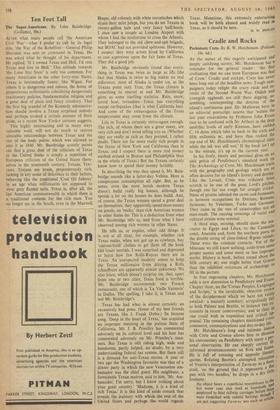Ten Feet Tall
The Super-Americans. By John Bainbridge. (Gollancz, 30s.)
AFTER what many people call 'the American Civil War'—what I prefer to call by its legal title, 'the War of the Rebellion'—General Philip Sheridan was sent to command in Texas. He was asked what he thought of his department. He replied, 'If I owned Texas and Hell, I'd rent Texas and live in Hell.' This attitude towards 'the Lone Star State' is only too common. For many Americans in the other forty-nine States, Texas is intrinsically funny, like Wigan. For others it is dangerous and odious, the home of preposterous millionaires subsidising dangerously reactionary policies, fundamentalist religion and a great deal of plain and fancy crookery. That the first big scandal of the Kennedy administra- tion should involve a Texan surprised nobody and perhaps evoked a certain amount of State pride, as a recent New Yorker cartoon suggests.
This highly entertaining and in many ways valuable work will not do much to restore amicable relationships between Texas and the rest of the body politic which was allowed to join it in 1846. Mr. Bainbridge acutely points out that a great deal of the criticism of Texas in the United States is simply a repetition of European criticism of the United States them- selves in the nineteenth century. Texans, Texi- cans, Texians are brash, preposterously rich, lacking in any sense of deference to their betters, behaving like the traditional 'Coal Oil Johnny' in an age when millionaires are supposed to wear grey flannel suits. Texas is, after all, the last American commonwealth in which there is a traditional costume for the rich man. You no longer see in the South, even in the Maxwell House, old colonels with white moustaches which strain their mint juleps, but you do see Texans in twenty-gallon hats and very fancy half-boots. I once saw a couple at London Airport with whom I had the misfortune to cross the Atlantic.
They belonged to the old chew-and-spit brigade, but BOAC had not provided spittoons. However, I suspect they were actors hired by California to cast aspersions upon the fair fame of Texas. They did a good job.
Mr. Bainbridge obviously found that every- thing in Texas was twice as large as life (the
fact that Alaska is twice as big makes no real difference; most of Alaska is under ice, as the Texans point out). True, the Texas climate is something to marvel at and Mr. Bainbridge gives us some startling statistics. Rain, snow, torrid heat, tornadoes—Texas has everything except earthquakes (that is what California has). And some of the extravagance of the Texas temperament may come from the climate.
Life in Texas is certainly extravagant enough. The rich, of whom there are a great many, are very rich and don't mind telling you so. (Whether they are really as rich as they pretend, I rather doubt. There are far more really rich people in the States of New York and California than in Texas, and I suspect there is more real money stashed around in Boston and Philadelphia than in the whole of Texas.) But the Texans certainly know how to spend their money lavishly.
In describing the way they spend it, Mr. Bain- bridge sounds like a latter-day Veblen. Here is conspicuous consumption all right. But, as he notes, even the most lavish modern Texan doesn't build really big houses, although he spends a lot on the houses he does build. And, of course, the Texan women spend a great deal on themselves; they apparently spend more money on jewels, on 'rocks,' than rich American women in other States do. This is a deduction from what Mr. Bainbridge tells us, and from what I have observed among rich women in other States.
He tells us, or implies, other odd things. It is not at all clear, for example, whether rich Texas males, when not got up as cowboys, buy 'custom-built' clothes or get them off the hook like lesser mortals. I was surprised and depressed to learn how few Rolls-Royces there are in Texas. An unexpected modesty seems to keep the Texan millionaire from driving a Rolls (chauffeurs are apparently almost unknown). We also learn, which doesn't surprise me, that, apart from one or two cities, Texas food is terrible. Mr. Bainbridge recommends two French restaurants, one of which is `La Vielle Varsovie' in Dallas. The spelling, I take it, is Texan and not Mr. Bainbridge's.
Texas has had what is almost certainly an excessively bad press. (Some of my best friends are Texans, like J. Frank Dobie.) Its famous song, 'Deep in the heart of Texas,' has acquired an improper meaning in the jealous State of California. Mr. J. B. Priestley has commented adversely on its cultural level and his host has commented adversely on Mr. Priestley's man- ners. But Texas is still riding high, wide and handsome, partly helped, no doubt, by a very understanding federal tax system. But there still is a demand for anti-Texan stories. A year or two ago the Washington favourite was that of a dinner party in which the new Venezuelan am- bassador was the chief guest. His neighbour, a formidable Texan matron, said to him, 'Mr. Am- bassador, I'm sorry, but I know nothing about your great country."Madame, it is a kind of rich Texas.' It is this kind of snide remark that reveals the jealousy with which the rest of the United States and perhaps the world regards Texas. Meantime, this extremely entertainiag book will be both abused and widely read la






























 Previous page
Previous page